Mike Koenig received his MFA in Creative Writing & Publishing Arts from the University of Baltimore. He currently lives in Columbia, Maryland and works for Discovery Communications. His fiction can be seen in Phoebe, Quiddity, Clover, and The Tulane Review.
The Lost Ones
“There doesn’t seem to be anything wrong with you,” Doctor Johnson said, looking up from his charts. “Medically speaking, you should be able to have a child.”
Emily was hoping this doctor, this expert, would be able to offer her some news about her condition. She had gotten used to the words seem and should. They were terrible words that offered no comfort because they came with no cure. No matter what the tests said, Emily knew, as any woman would, that three miscarriages don’t just happen. The situation wasn’t just unfortunate; it was scary. And without a definitive medical reason, her miscarriages were terrifying. Statements like: this is just one of those things, or the bad end of statistics didn’t give Emily any consolation. Neither did Dr. Johnson’s assurances that Emily was as capable of having a child as anyone else. She was a completely healthy twenty-nine-year-old woman with many child-rearing years left in her.
After the appointment Emily met her mother for lunch.
“Did he say anything different?” Emily’s mother, Lauren, asked after hearing about the appointment. “Anything helpful?”
“Not really. He said it’s a good sign that I’m able to get pregnant and that I should keep taking the fertility pills Dr. Kumar prescribed.”
Lauren shook her head. “This is just awful what they put you through. Just awful.”
“All we can do is keep trying,” Emily said, lifting her glass of water.
“What does Tom think?”
“About what?” Emily asked. She was looking around the restaurant more than she was looking at her mother.
“Did you tell him what this doctor said?”
“No,” Emily admitted, “he doesn’t know about this appointment.”
“You shouldn’t do that,” Lauren said, with an all-too-motherly furrowed brow, “You shouldn’t sneak off to a doctor without telling Tom.”
“I know. He’s just not much for second opinions, much less fourth.”
“Still, you should tell him. He is your husband.”
“I’ll tell him tonight,” Emily said.
*****
The first pregnancy had been Emily’s longest. It lasted about ten weeks, long enough that she could feel the baby kick, or at least Emily thought she felt the baby kick. It was just as likely some indigestion mixed with wishful thinking. Emily and her mother had started planning the nursery. It was going to be a gender-neutral yellow color with teddy bear wallpaper. Emily, who taught second grade, was determined to finish the room before her summer break was over. She spent a week priming and painting the room with her mother, and another week cutting out and pasting the teddy bears along the wall. The room was golden yellow and when the windows were open light bounced around, giving the eyes of the teddy bears actual life.
The Friday they finished they went to the mall for a celebratory lunch, both looking and not looking at baby items. They ended up buying a mahogany rocking chair with a soft white cushion. The chair had flat legs instead of round ones and swung more than rocked. Emily felt it was a good reading chair. She planned to start reading to the child in utero. And since the chair came with free delivery, it seemed the perfect deal. It arrived the same day it was purchased and Emily was set up and reading by the time Tom came home.
“Wow,” Tom said at the doorway.
“What?” Emily said.
“You look like a real mother.”
Emily gave a playful frown.
Tom kissed her, first on the forehead then the stomach. “You look beautiful.”
“So you like the chair.”
Tom nodded.
“Good, cause it’s non-refundable.”
Emily listed the things she had seen that day. She particularly liked a stroller that could fold into quarters. It was only twenty pounds but very stable. She also thought the crib should be placed away from the window, so the sun wouldn’t bother the baby in the morning, and the changing table could go near the door and the rocker in its current spot because it seemed the focal point of the room. Emily talked so fast that there was hardly a space between the words for Tom to agree or disagree. He just smiled and took in Emily’s excitement.
“So what do you think?” Emily offered at the end.
“I think you might not need me at all. You and your mother have this whole thing worked out.”
“Well, you helped,” Emily said, patting her still flat belly. “A rather enjoyable help at that.”
“Is there anything else you wanted to do before you go back to work?”
“I don’t think so.”
“I was just thinking,” Tom was rubbing Emily’s shoulders as he talked, “maybe we could take a few days, just for ourselves at that cottage at Castle Lake. We might not be able to get a real vacation next year with the baby.” Tom was now kissing Emily’s neck between words, “How’s that sound? A couple of days, just us?”
*****
The night of Emily’s fourth opinion, Tom came home around eight. Emily had left him a pork chop and green beans on the kitchen counter with the note, “went for a jog.” Tom was watching TV and napping when Emily came back and didn’t hear her until she started drying her hair with the electric blower.
“Did I wake you?” she asked, when Tom sat up.
“No, I was up.”
Emily was combing her brown shoulder-length hair.
“I like Patricia if it’s a girl and James for a boy,” Emily said.
“I thought we liked Andrew and Julie,” Tom responded.
“That was for the last baby.”
Tom got up and took off his dress shirt and pants, hanging the pants neatly in the closet.
“So,” Emily asked in a slightly high-pitched voice.
“What?”
“Do you like the names?”
“I don’t know why we have to pick new names—I like Julie, Jules for short.”
“We can’t use that name.”
“But we never told anyone. No one will know.”
“I’ll know,” Emily said, putting her brush down.
Tom went to the bathroom to brush his teeth. When he came back he said, “Why don’t we just wait until we get pregnant before picking out names?”
“Okay,” she said, “but they have to be new names.”
Tom agreed to this condition and apologized. It was easier than fighting. And he supposed Trish was as cute as Jules. He kissed his wife. And remembered how he used to pick fights with her when he was in law school just for the chance to make up with her later. Back then she bought underwear at Victoria’s Secret, surfing the online catalog late into the night. He hadn’t seen a colored bra in what seemed like years. It was just standard white Hanes these days. He caressed his wife, first on the stomach but then moved upwards.
“I’m not ovulating,” Emily said without moving. Tom stopped his playful advances and rolled to his right. They were back to back, separated by a foot of clean white sheets. “Next week,” Emily whispered.
Tom could remember a time before babies when sex was fun. When his wife coming out of the shower was a call to action, when she’d slowly remove her towel and perform a small dance before ripping off his clothes in passion. He remembered a time when waiting five minutes was excruciating, and if they touched each other’s hand at dinner, they’d race to the bedroom. He remembered sex that was full of moans and looks of ecstasy, a feeling of connection with his wife that was now easily postponed with the words “next week.” This of course was only a promise of intercourse, not passion, not sex. After the act, they didn’t kiss or hold each another anymore; they didn’t even talk. Emily would immediately move into some yoga position that supposedly helped conception, often chanting herself into a trance that would remove bad energy from her body. At this point Tom would be unneeded, and he’d retreat to the basement.
*****
“Did you tell your parents, yet?” Emily asked.
“Tell them what?”
“About the miscarriage.”
“They didn’t know we were pregnant.” Tom didn’t turn his head from the road; he didn’t need to turn to feel his wife’s glare. It was their fifth miscarriage, and Tom had decided to stop talking about the pregnancies until they got to the second trimester. This pregnancy, Baby Susan, because Emily was sure it would be a girl, had only lasted three weeks from the positive pregnancy test to the pains that sent Emily to the bathroom.
“I just didn’t want to tell them in case this happened again,” Tom finally said, still feeling his wife’s glare.
“Whatever’s easier for you,” Emily said.
They drove in silence the rest of the way. When he pulled up to the church, he asked Emily if she was sure she wanted to come.
“She’s my niece too,” Emily said.
“I just wasn’t sure if you. . . I can make an excuse if you don’t want to see everyone.”
“I’m fine,” Emily said with a plastic smile.
They walked together to the church, but separated once inside, as Tom, the godfather-to-be, was needed in the annex.
After the priest gave some brief instructions Erin, Tom’s sister-in-law, offered Tom the baby to hold. Lily’s eyes opened wider when passed to Tom and she gave a soft coo that made Tom smile in a sad clown sort of way. His eyes were glossy, not quite wet but full of wanting. Tom pulled Lily a little closer, feeling each light exhale against his lap.
“You and Emily have any luck?” Tom’s brother, Jim, asked.
Erin shot him a look.
“What?”
“You don’t ask such things,” Erin said.
“He’s my brother,” Jim said.
“It’s not polite,” Erin replied.
“We lost another one,” Tom said, letting Lily grab his finger.
“What?”
“I’m sorry, Tom,” Erin said, putting her arm around his shoulder.
“Three days ago. We weren’t going to tell anyone.”
“Is Emily doing okay?” Erin asked. “If you guys don’t feel up to . . .”
“I told her she could stay home. But she wanted to come.”
“I feel terrible,” Jim interrupted, “Lily was an accident. And you. . . ”
“She wasn’t an accident,” Erin said, “She was a surprise.”
“I’m just saying it doesn’t make sense that they’re trying to have a kid and can’t and we’re not trying and have one.”
“Don’t say it like that,” Erin said.
“I feel bad, is all. It’s like we took his kid.”
“Don’t be ridiculous,” Tom said, “one has nothing to do with the other. We’re just unlucky.” Tom pulled Lily into a hug against his chest. “But for the sake of my wife, let’s try not to let anyone bring it up at the party.”
*****
“Honey,” Tom said, coming back to the living room, “did you move my stuff?”
There was no reply, so Tom went to the kitchen. “I had some adoption pamphlets from this guy at work. Did you see them?”
Emily looked at the kitchen trashcan.
“I go to the bathroom and you throw out my papers?” Tom asked.
“I’m just not ready to give up yet.”
Emily turned her attention to the onions, cutting them in loud thuds.
“It’s not giving up. It’s just looking at options.”
“That’s not an option,” Emily said, still focused on cutting vegetables.
“Well, it’s like a three year process, so I thought we should at least look into it now. I thought you wanted more than one child.’
“I’m not ready to raise someone else’s baby.”
“It would be our baby.”
“Do we have to do this tonight?”
Tom stopped talking and poked his head over the trashcan. He saw the pamphlets at the top, but knew better than to fish them out. Instead, he returned to the living room couch and flipped through the channels, never settling on a show to watch. Emily’s cutting continued for about ten minutes, until she went to bed without cooking anything or saying goodnight.
*****
It was at Castle Lake that Emily had lost the first baby, Justin for a boy, Nancy for a girl. She had had bad cramps for hours before saying anything to Tom. The nearest hospital was a two-hour drive, and Emily was screaming as Tom drove. About twenty minutes before they got to the hospital a calm feeling came over Emily, some type of relief. Tom didn’t ask if she felt better or not and didn’t point to the blood that was seeping through her sweatpants.
When the doctor reported the baby was lost, that there was nothing anyone could have done, Emily slapped Tom across the face. “Why did we leave home? This wouldn’t have happened at home.” Then she turned into her pillow and cried. Tom’s own body had gone numb with the news; he reached out to touch her shoulder but Emily pulled away. For a few minutes he tried to think of something to say, something comforting, but the words never came. He finally sank into a chair and watched as Emily emptied herself through tears.
Emily was discharged from the hospital, and they went back to the cabin to collect their luggage. It was a quiet ride with neither music nor conversation, just the sound of the engine. There was a small blood spot on the passenger’s seat that forced Emily to sit in the back. She stared out the window as they drove. The trees were still green, and the sunlight of the day made everything look alive and feel terrible.
Within a week Tom would sell the car rather than clean it. But for now they had to avoid the spot. About an hour down the road Emily put her head next to Tom’s headrest.
“I’m sorry for what I said at the hospital.” Emily’s voice was soft, “I know this wasn’t your fault.”
Tom gave her a kiss on the cheek. “We’ll get pregnant again soon.”
They didn’t say much after that, but the car ride didn’t feel as eerie. For a while Tom even put his right hand between the seats so he could hold Emily’s hand as he drove. That was enough to make him think things would be all right.
*****
“This calls for a celebration,” Lauren said upon hearing of her daughter’s pregnancy. “I’ve been waiting three years for this.”
Tom smiled at his mother-in-law as she got the champagne glasses from the top cabinet. She had been asking for grandkids since she first heard that Tom had proposed and now the promise of their arrival gave Lauren a pregnancy glow all her own.
“I was so worried about you guys. Three years.”
“Well, we weren’t exactly trying all this time,” Tom said.
“Mom had trouble conceiving,” Emily said, “she assumes everyone else does.”
“It took us six years,” Lauren said, “I wouldn’t wish that on anyone, not anyone. But when you feel that first kick, when you feel the baby growing inside, that’s when you really know what love is.” Lauren gave Emily a Hallmark smile that made Tom snicker. “I almost feel sorry for you men,” Lauren continued, “You’ll never know what that’s like.”
“Well,” Tom answered, “from what I hear labor is no picnic. So I’m quite happy to not be the pregnant one.”
“Don’t you listen to him,” Lauren said, “it isn’t that bad.”
Lauren poured two glasses of champagne. “I wish your father were here,” Lauren said, handing a glass to Tom. “I hate to celebrate without him.”
“Hey, where’s mine?” said Emily.
“You can’t have alcohol,” Lauren said.
“I don’t think a sip of champagne is going to matter, Mom.”
Lauren grudgingly poured a third glass much smaller than the first two and offered a congratulatory cheer before the three drank.
*****
When Tom entered the bathroom, Emily was on the floor holding her stomach. “Call an ambulance,” she said. Tom knew immediately the baby was lost. As they waited for the ambulance to come he got on the tile floor with her, holding her hands in his. It was the way he used to hold her when they were first married and spent Saturdays lying in bed together.
“Why can’t I be a mother?” Emily asked.
Tom kissed her on the forehead. He couldn’t comfort her anymore than that. That was the third miscarriage, the Andrew or Julie miscarriage.
In addition to seeking her second, third, and fourth opinions about her physical condition Emily also started going to church after that miscarriage. At first it was just an occasional Sunday, but then it became more regular, and finally included bi-weekly counseling sessions with Father Mark.
“Am I being punished,” she asked the priest, “somehow tested like Job?”
“I don’t think that’s the case,” the priest answered.
“But the doctors tell me I’m healthy. They can’t explain why I keep losing these babies.”
“We must always have faith in His plan,” Father Mark said. “We can’t always explain it, but we must have faith that it is right.”
“My husband thinks we should adopt.”
“I’d be more than happy to recommend a good agency; Catholic Charities does wonderful work.”
“Could you really love a child as much, knowing it wasn’t actually yours?”
“I know many people who have adopted,” Father Mark answered, “and they are just as loving as any other parents.”
It was the answer Emily expected, the argument Tom had always provided. But there was something inside of her that doubted its truth. And in the wake of her “good health” she couldn’t see how adopting was the right solution, even if adopting a foreign child, as Tom now suggested, sped up the process. She couldn’t see herself loving at first sight the way her mother had loved at first feel.
*****
Tom didn’t recognize his refrigerator anymore. There used to be soda and beer and nacho cheese on the door. The peanut butter used to be Jif with pieces of peanuts in it. Now it was some Whole Foods goo, the oil rose to the top and needed to be stirred for twenty minutes to make a sandwich. Tom used to get 2% milk and white bread; now there was only soy milk and whole wheat multigrain. Tom never brought his lunch with him to work anymore. It was the one chance a day he got to eat what he liked.
But it wasn’t just the food that had changed. Emily herself had. She did yoga in the morning, waking at five to do her stretches before school. She also went to the gym in the evening, for light calisthenics. There was only about an hour a day when he could actually sit and talk with her. But even that was difficult because all she wanted to do was talk babies. There were no more “how was your day” pleasantries, no more funny stories about what her kids had done in class. It was all business. We need to try this or that. She read medical journals like a pharmacist and knew which pills she might consider trying next. After her sixth miscarriage, the Daniel/Danielle miscarriage, she found a doctor who would prescribe Cervexus, an experimental drug that strengthened the walls of her uterus, one potential cause for miscarriages, though he noted like the doctors before him, that her uterus did not seem particularly weak. Still, the drug gave Emily a new sense of accomplishment and her regimen of exercising, cleaning, dieting, existential breathing, and researching made her feel in control.
The house was different too. It had been clean before, but now it was spotless. Emily ran the dishwasher every night, not wanting any germs in the house, and scrubbed the tile of the kitchen floor and bathrooms religiously. Since no one could tell her exactly what was wrong she wanted to eliminate any possible cause of her unhappy life. Cleanliness became a calling for her. And the house was almost a museum where Tom couldn’t touch or use objects because he was not as clean as them.
But the most jarring change for Tom was the crucifix that hung over the bed. It was a testament to Emily’s new life as a devout Catholic, a promise that if she was deemed worthy enough to have a child, she would raise it in the Church. Tom didn’t mind the religion entering her life. He too was Catholic, if only in name. What disturbed him about the crucifix was how Emily looked at it with unwavering intensity, offering it small prayers before they had sex.
What had started as understandable eccentricities for a woman under stress had developed into an insane routine. Tom no longer saw the woman he married in his wife, and when she looked at the cross as they made orgasm-less love, he had no idea who she was.
*****
Emily locked herself in the bathroom. They had a full-length mirror on the door and she was looking at herself with her T-shirt rolled up. She was a thin thirty-two-year-old, merely three days pregnant, or at least it had been three days since the positive pregnancy test. Emily arched her back and tried to make herself look fat. Not satisfied with the reflected image she rolled down her shirt and pushed her stomach out. In a few months she’d look this big.
She continued playing in the mirror, trying to imagine herself in the third trimester. The door handle jiggled.
“I’m in here,” Emily said.
“Is everything all right?” Tom asked.
“Yeah.”
Emily fixed her shirt and splashed some water on her face before coming out. Tom was sitting on the edge of the bed, a pale look on his face.
“Is everything okay?” Tom asked, nodding toward her stomach.
“Of course.”
“You were in there for forty minutes.”
“I was just— you know women in the bathroom.”
Emily sat next to Tom on the bed gently rubbing his thigh.
“I thought. . .” Tom stopped his words.
“What happened at the lake isn’t going to happen again. We’re going to be fine,” Emily said, giving Tom a kiss. “I feel so much better this time.”
Tom smiled. It would be another week before he’d get called to meet Emily at the emergency room.
*****
For Tom’s fortieth birthday Emily had the whole extended family over for dinner. It was a light fare of lemon chicken with brown rice and carrot cake for dessert. It was great to eat dinner with the whole family. Tom had two nephews, Andy and Scott, and two nieces, Lily and Brittany, whom he loved but rarely saw.
“How old are you, Uncle Tom?” asked his five year-old niece Lily as Emily started lighting the candles on the birthday cake.
“I’m this many,” he said flashing all ten fingers four times.
“How old?”
“This many,” he said and flashed his fingers up again.
“You’re old,” Lily said, still unclear of his exact age.
“I know,” Tom agreed, “I think I need help blowing out the candles.”
As the family began singing Happy Birthday, Tom lifted Lily to his knee. He filled his cheeks with air anticipating the amount needed to blow all the candles out. Lily mimicked her uncle, and when the song was over they worked together to get all forty candles out.
“Did you make a wish?” Tom asked.
“Yeah.”
“What did you wish for?”
“I can’t tell you.”
“Oh, that’s right, I forgot.”
After cake Tom let Lily open the gifts for him. She tore through the paper in seconds, barely looking at the contents, mostly shirts and books, before moving to the next package. As Lily played with the discarded paper Tom looked at his wife, hoping to share a moment. But there was a bleakness in Emily’s eyes, as if she were in her own world far away from Tom and Lily.
After the guests, left Tom and Emily went to bed. As Tom took off his shirt, Emily lay on the bed, seductively calling him over with her index finger. Tom slid over the top sheet then kissed his wife on the neck and shoulders. After a few minutes of kissing, Emily got up and gave Tom a little strip show. He took off his own clothes, remembering his honeymoon and sex before pregnancies. He thought tonight would be like the old times, but as Emily climbed back in bed she wasn’t staring at Tom, but rather at the crucifix that hung over the bed.
Tom laid Emily on her stomach and stood behind her.
“What are you doing? This is not the ideal position for conception,” she said, wiggling to her back.
“I thought tonight could just be about us. Maybe we can mix it up. You know like we used to.”
“I don’t want to waste my most fertile days.”
“Do you really think position matters that much?”
“The experts say it helps.”
“Well, can we just do it for real. . . You know, for my birthday. I mean, do you have to just lie there?”
“I have to focus on my breathing, create an inviting space for the baby.”
“I’m just saying once a year, can we have sex like people who love each other, not people trying to create a baby?”
“We only get one good chance a month. Shouldn’t we do everything possible to get pregnant?” Emily said.
“You really think staring at that crucifix and breathing every six seconds matters? Our problem isn’t getting pregnant. We’ve always been able to do that.”
“This time it’ll be different. I’m on those pills now, and we’ve started a new hormone treatment. It’s going to happen, I deserve it.”
Tom was sitting on the bed now. “Deserve it,” Tom repeated.
“I know I can carry to term,” Emily said, “I know I can. Once we get pregnant it’ll be different. You’ll see. We’re going to do it this time. We’ve been doing everything right—diet, exercise, prayer, everything.”
Tom turned to Emily, “And what if it doesn’t happen?”
“It will,” Emily said.
“It’s not a question of deserve. Sometimes it just doesn’t happen.”
Emily was silent.
“I don’t know what our problem is,” Tom continued, “but I don’t think our milk and bread has anything to do with it. I don’t think position has anything to do with it.”
“What harm does it do to try everything?” Emily asked.
Tom looked at Emily, “I think you need to start seeing a therapist about this.”
Emily laughed, “I talk to Father Mark once a week.”
“No, I mean a real therapist.”
Emily was silent.
“What harm could it do to try one more thing?” Tom asked.
They didn’t have sex that night or the next day or the day after that. They skipped two more of Emily’s cycles, and Tom spent most nights in the guestroom. Emily didn’t want to see a therapist and still wouldn’t talk of adoption. Her only reason for denying both requests was that it wasn’t time to give up, though she wouldn’t say, even now entering her late thirties, when the exact time to give up would be.
*****
They were married in Jamaica in 2000. Emily wore a strapless white wedding gown that flowed with the breeze coming off the ocean. Her hair had small curls, and she took deep breaths to keep herself from crying.
Tom wore a light hemp pants suit with a cotton button-up shirt and no tie. He wasn’t moved to tears, but he couldn’t help smiling and couldn’t look away from Emily. She was captivating even through the deep breaths that held back happy tears.
As Tom repeated his vows the world seemed to slow; he could feel every movement of his mouth and feel Emily’s hands tighten around his. The justice of the peace then turned to Emily whose voice was barely a whisper as she spoke, yet unmistakably happy. As soon as she got the words out, she jumped into a kiss before a pronouncement of marriage could actually be made. The justice of the peace made a small joke about Emily’s excitement that seemed to take away her tears. Or maybe it was just Tom’s arms around her waist.
Tom thought about that day often when preparing the paperwork for the divorce. He would let her keep the house and gave her more of his personal assets- 401K and stocks- than she’d ever think to ask for. He loved her despite everything, which made signing the divorce decree difficult. She hadn’t looked at him directly in any of the meetings with the lawyers, which made leaving easier. Had he seen her face, her eyes, he would have been tempted to sink with the ship.
*****
As the plane rolled toward the runway, Tom closed his book and looked out the window. It was his first flight ever without someone he knew beside him: his ex-wife, his brother, his father. It was a twenty-hour flight to Vietnam, and the return flight would be just two days later. Just enough time to sign forms and make everything legal.
As the engines geared up, Tom felt both nervous and excited. His whole world was about to change. And the roar of the plane gave the trip the feeling of reality. The flight attendant went up the aisle checking everyone’s seatbelts. It was a full flight, so the process took several minutes. But Tom didn’t care. It was a bright cloudless day; nothing would stop the trip now.
Some fifty miles away in the home they once shared, Emily sat alone in the Teddy Bear Room. The room was still empty save for the chair that sat by the window, in which she quietly rocked. In her hand was a rosary, and as she recited her Hail Marys, she watched the neighborhood kids play touch football in the street in front of her house. Johnny, who lived three houses down the street, was playing quarterback for both teams and threw dead-on spirals as he marched the opposing squads up and down the field. Emily smiled as they celebrated the latest touchdown and tried to wave at the boys, but they didn’t see her. So she turned her attention back to the rosary, falling into a slight trance as she prayed. Everything was going to work out. If nothing else, Emily was sure of that.

 Dancing in the Baron’s Shadow
Dancing in the Baron’s Shadow
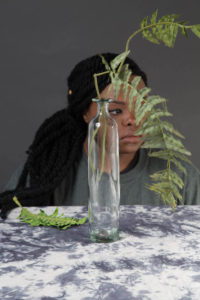

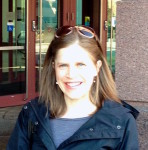

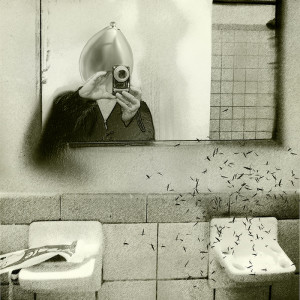


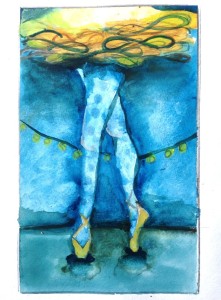
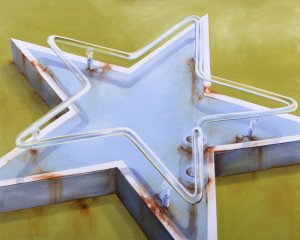
 Katie Cortese
Katie Cortese Sherrie Flick
Sherrie Flick  Neil Carpathios
Neil Carpathios Ashley Cowger
Ashley Cowger Rahad Abir
Rahad Abir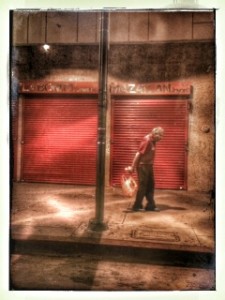





 Marie Mayhugh
Marie Mayhugh





 Katrine Marie Guldager
Katrine Marie Guldager Lindy Falk van Rooyen (translator) was born into a multi-lingual family (Danish/English/Afrikaans) in South Africa. She studied Law at Stellenbosch University, South Africa, and worked as an attorney in Cape Town until she emigrated to Copenhagen in 1998. After living and working in Denmark as a commercial translator and legal liaison for four and a half years, she moved to Hamburg, Germany in 2002. She holds an LL.M in Commercial Law and an MA in Scandinavian and English Literature from the University of Hamburg. Her book on Virginia Woolf’s fiction, Mapping the Modern Mind: Virginia Woolf’s parodic approach to the art of fiction in ‘Jacob’s Room’ (Diplomica, 2011) is an adaptation of her MA thesis. She is a freelance writer and has been working as a literary translator since 2012.
Lindy Falk van Rooyen (translator) was born into a multi-lingual family (Danish/English/Afrikaans) in South Africa. She studied Law at Stellenbosch University, South Africa, and worked as an attorney in Cape Town until she emigrated to Copenhagen in 1998. After living and working in Denmark as a commercial translator and legal liaison for four and a half years, she moved to Hamburg, Germany in 2002. She holds an LL.M in Commercial Law and an MA in Scandinavian and English Literature from the University of Hamburg. Her book on Virginia Woolf’s fiction, Mapping the Modern Mind: Virginia Woolf’s parodic approach to the art of fiction in ‘Jacob’s Room’ (Diplomica, 2011) is an adaptation of her MA thesis. She is a freelance writer and has been working as a literary translator since 2012.  Leslie Santikian
Leslie Santikian 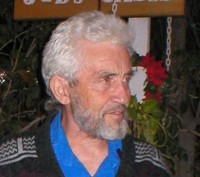 Robert Joe Stout
Robert Joe Stout